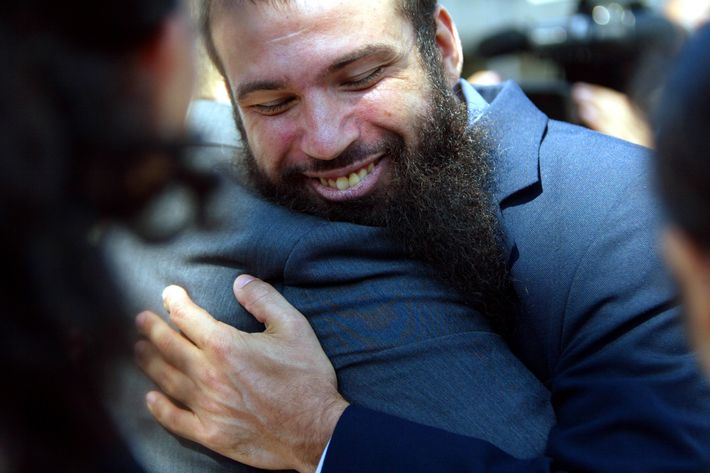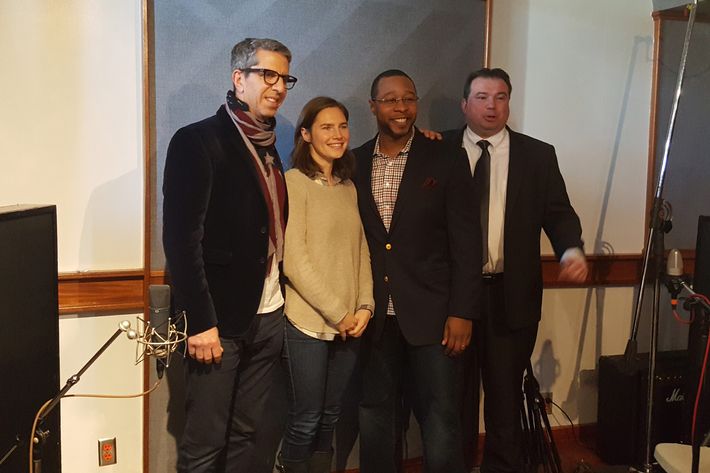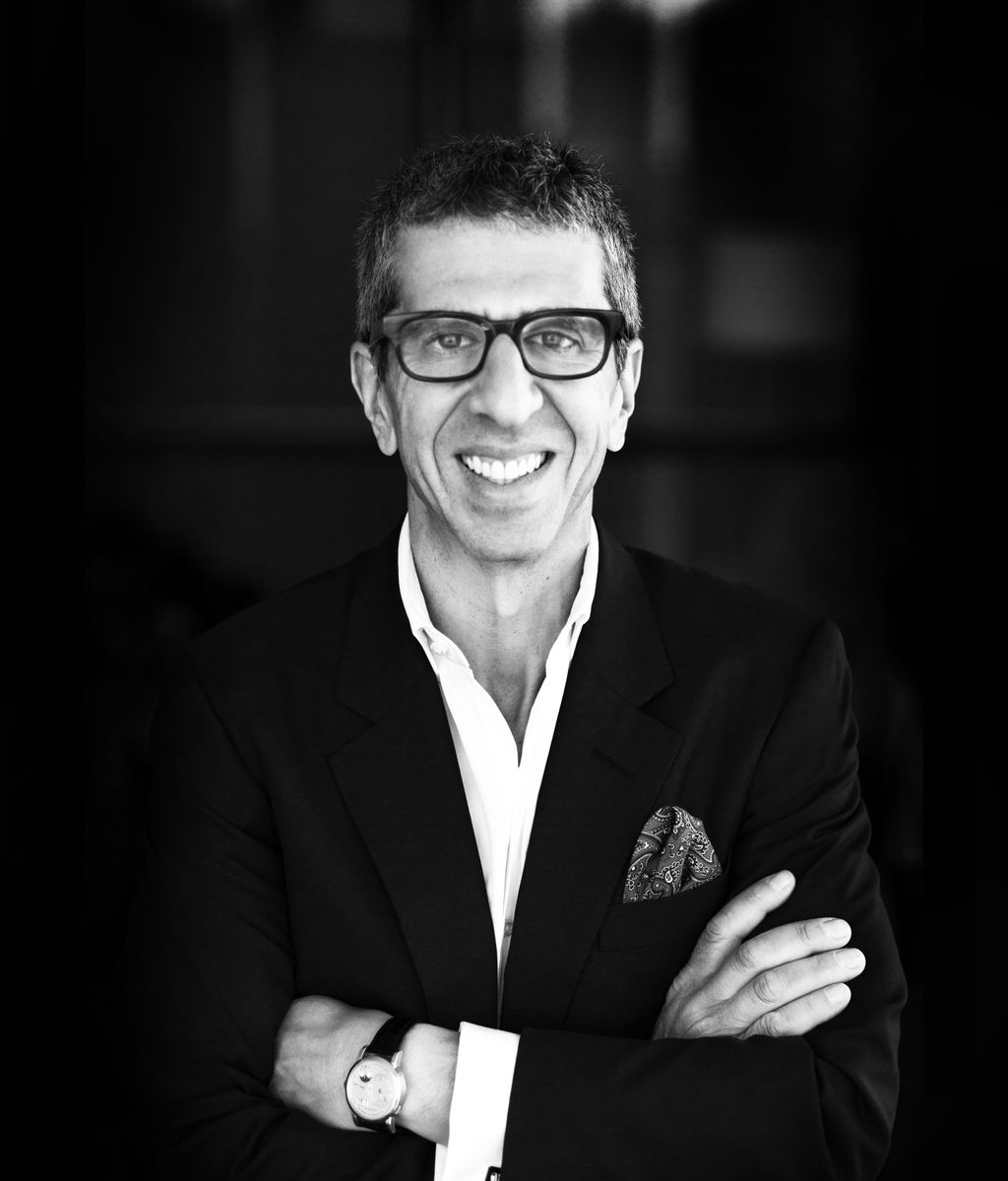“Wow, that is quite the board!” Amanda Knox exclaimed on Friday morning, taking in the massive mixing console at the Platinum Sound recording studio in Hell’s Kitchen, as she deposited her luggage in a corner of the room. The former exchange student, who was prosecuted by Italian authorities for the murder of her roommate based on a ludicrous theory that nonetheless inspired feverishly lurid headlines around the world, was in town from Seattle to tape a holiday edition of the Wrongful Conviction podcast. Graceful and warm, with a bright easy smile, she wore a loose putty-colored sweater and bore little resemblance to the accused teen temptress and sadistic killer whose supposed misdeeds were so gleefully chronicled by the tabloid media. (The charges were finally thrown out by the Italian Supreme Court in 2015, and a documentary on the case is currently available on Netflix.)
Knox and the show’s other guests, Jarrett Adams and Jeff Deskovic, had each been convicted of a savage crime and subsequently proven innocent. For this installment of the series, which the production team was calling, half-jokingly, “A Very Special Wrongful Christmas,” the plan was to talk about what it’s like to celebrate the holidays behind bars, when your situation is more Franz Kafka than Frank Capra.
The recording facility, which has also hosted such well-known artists as Rihanna, Shakira, and Kendrick Lamar, features an impressive 85-channel vintage SSL console. That might seem like overkill for a podcast, but the series’ creator and host, Jason Flom, is hardly a typical podcaster. Described in a lengthy 2003 New Yorker profile as “one of the most successful record men of the last 20 years,” he is the founder and CEO of Lava Records and has held the top jobs at Atlantic, Virgin, and Capitol. Over the course of his nearly four-decade-long career, he discovered and nurtured an impressive roster of acts, including Twisted Sister, White Lion, Stone Temple Pilots, Matchbox 20, Skid Row, Tori Amos, Jewel, Hootie & the Blowfish, Kid Rock, Lorde, and Katy Perry.

In certain quarters, a few of the names on that list might get Flom himself charged with a crime. But his deep philanthropic commitment more than compensates. The affable and well-regarded industry veteran has spent decades fighting to reform the justice system. He is the founding board member of the Innocence Project, which has exonerated nearly 350 wrongfully convicted people. He founded the Bronx Freedom Fund, which helps cover bail for indigent defendants charged with low-level offenses. He is a board member of Families Against Mandatory Minimums, The Legal Action Center, the Drug Policy Alliance, and the NYU Prison Education Program.
This year, he launched the podcast featuring his intimate conversations with the exonerated themselves. Perhaps surprisingly, given its grave subject matter, the series hit a nerve, reaching as high as No. 7 on the iTunes podcast chart. Flom has committed to donate a dollar to the Innocence Project for every download or stream, up to $1 million, and they’re nearly a third of the way there. The episodes are often spellbinding, due in part to Flom’s skillful, empathetic interviewing style. He does stand-up in his spare time, and says he “gets happy around a microphone.” Perhaps more critical to the show’s success is the opportunity to hear these harrowing stories of injustice unfiltered, making for a powerful addition to the newly reinvigorated true-crime genre (Serial, Making a Murderer, The Jinx).
Flom attributes his interest in criminal justice to reading Victor Hugo’s Les Miserables, which he devoured in his 20s. “I was actually sobbing at the end of it,” he said. But he didn’t get involved in the issue until the early ’90s, when he came across a newspaper article about a man named Steven Lennon, who had been denied parole and was serving 15-to-life on a cocaine-possession charge. Flom persuaded a lawyer to take the case pro bono, and Lennon was eventually released on a technicality. Flom held Lennon’s mother’s hand in court as the decision was announced. “That was a cathartic moment for me,” he said. “My first thought thought was ‘That was fun. I want to do more of that.’”
Flom has an interesting background. His father, Joseph Flom, led the law firm Skadden Arps, and earned the nickname “Mr. Takeover” for his pioneering work as a mergers and acquisitions specialist. But even as he was putting together those massive “Barbarians at the Gate”–style deals, the elder Flom had a philanthropic streak of his own, sponsoring college tuition for kids from low-income backgrounds and creating the Skadden Fellows program, which funds salaries for talented law-school graduates to work in public-welfare jobs for two years. “That was his proudest achievement,” Flom says.
The music executive, who is wiry and unpretentious, was wearing horn-rim glasses, suede boots, and a velvety dark-blue sport jacket over a T-shirt. A scarf resembling a threadbare American flag was looped around his neck. He gave the group a quick introduction to the podcast, and ran through a rough outline. Then he removed his collection of bracelets so their jangling wouldn’t interfere with the recording, and led his guests into the adjacent studio space.
The hour flew by. Adams, who was falsely charged with gang rape at age 17 and served nearly a decade of a 28-year sentence before being exonerated in 2007, recalled staying up all night before every holiday behind bars in hopes of sleeping through the next day to avoid thinking about his situation. (He subsequently earned a law degree, and he now lives in New York, working on post-conviction litigation for the Innocence Project and running a nonprofit called Life After Justice.) Deskovic, who was just 16 when he was accused of rape and murder and served 16 years before his exoneration, remembered how a civilian volunteer arrived on the tier to play Christmas carols on the bugle each year, only to be met with a chorus of shouted obscenities. And Knox sang a few bars of “Aveinu Shalom Aleichem” in Italian, fondly recalling a sympathetic priest who invited her to accompany him on guitar during mass and taught her the song for one Christmas service. “The musical part of my brain is about to explode,” Flom said when she’d finished. “My mind is going to a mix of your Jewish-Italian Christmas song and the bugle with the curses. If only we could get Frank Zappa …”

Afterwards, Knox, who first met Flom in 2014 when she was invited to an annual conference for exonerees (her final appeal was still pending at the time), described him as “an incredible force in this movement.” Deskovic agreed, noting that “his level of commitment to the cause, as somebody who has not been wrongfully convicted and who doesn’t have a family member who has been, is phenomenal. It’s very meaningful.” They also had praise for Flom’s down-to-earth approach to the issue. “He’s just so refreshing,” Knox said, turning to face him. “The lawyers are doing their job, but they can be a little dry sometimes. You’re way looser.”
Inevitably, talk turned to politics. It had been an ominous morning. News outlets were reporting that President-elect Donald Trump had offered the job of Attorney General to Senator Jeff Sessions, no great champion of civil rights. “He has been a real thorn in the side of the criminal-justice reform movement,” Flom said. “He seems to be aggressively disinterested in, and even hostile to, the plight of the exonerees.”
But there was some disagreement as to just how bad the new administration might be. For his part, Deskovic was willing to give Trump a chance. After all, he pointed out, the liberal hero Bill Clinton had a disastrous legacy on the issue. He signed the Antiterrorism and Effective Death Penalty Act, which severely limited the ability of federal courts to help free the wrongly imprisoned. He signed the 1994 crime bill, with its “three strikes” provision, and supported other policies that led to years of mass incarceration, devastating entire communities. And he presided over the execution of Ricky Ray Rector, despite the man’s mental incapacity due to a suicide attempt behind bars.
Knox acknowledged a little ambivalence as well. Although she strongly opposes the president-elect and even wrote a newspaper column denouncing his candidacy, she acknowledged a bit of awkwardness, given that in 2011 Trump had donated money to her defense and spoken out on her behalf. That said, she believes his comments, which included calling for a boycott of Italy if she weren’t immediately released, likely did her more harm than good, inflaming anti-American sentiment in the country. She pointed out that Trump had also waded into another controversial case, the flawed prosecution of the so-called Central Park Five, and gotten it wrong. Two weeks after five African-American and Latino teenagers were charged with the 1989 rape and attempted murder of a jogger in Central Park, Trump published an inflammatory advertisement in the city’s leading newspapers calling for the reinstatement of the death penalty. Although the accused teenagers were later exonerated as well (Flom interviewed one, Raymond Santana, on Wrongful Conviction’s first episode), the president-elect has yet to apologize for essentially calling for their deaths. In fact, he recently insisted that they are actually guilty despite the exculpatory DNA evidence and the confession of the real criminal.
“I can’t help wondering why he supported me and not them,” Knox said. “Is it because I was a young female? Because I was white?”

Watching the three exonerees interact, one couldn’t help but be struck by how at peace they seemed over the multiple injustices they’d suffered — the long nights of fear and loneliness, the public vilification, the stolen years they will never get back. Nobody seemed angry. As Flom told me later, “I’m continually amazed by the almost total lack of bitterness that exonerees exude.” When I asked Deskovic how he felt about the police and prosecutors who’d put him behind bars as a teenager despite having evidence of his innocence, he insisted flatly, “I don’t think about them.” He now runs his own nonprofit, the Jeffrey Deskovic Foundation, which has successfully exonerated two wrongfully convicted inmates.
“My attorney told me the best revenge is success,” Adams said with a grin. “They hate that. I had a mandatory release in 2019, and here I am practicing law. You tell me who’s winning?”
Knox, who has also become a vocal advocate of criminal justice reform, was perhaps the most philosophical of the group. “Something horrible happened, and I was blamed for it, and because people were so entrenched in their anger about it, they were blinded to the reality of how complex it was,” she said. “It’s not that we’re not angry. But I don’t want to repeat the same mistake. If I get all fire-and-brimstone about what happened to me, that’s going to blind me and disable me from being able to do anything practical about the problem.”
For Flom, who seems to have no shortage of practical ideas, the primary goal of the podcast is to educate listeners — in particular, the would-be jurors among us — about how common false confessions actually are in criminal cases, particularly among juveniles, and to remind the public that not everything a prosecutor or police officer tells them is automatically true.
The way Knox sees it, the podcast is fulfilling another critical role: For many of those who have been wrongfully convicted, simply being heard is “the most helpful thing,” she said. “It helps you to not feel like a crazy person. This goes for victims of crime as well as victims of the criminal-justice system. Acknowledgement is the first thing we can give to people to make it up to them.”
